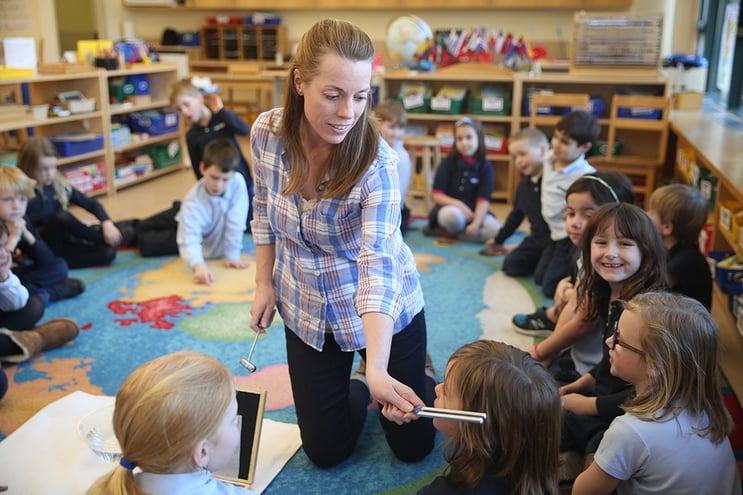Last week I was working with a few students when one of them turned to me and said, "Why don't we ever do science?" After I pulled myself up off the floor out of shock, I took a moment to think for a bit. I mean, we had just finished a six-week-long unit titled "Human Body" where the students explored how the different body systems interacted together to create a working system. Was that not science-y enough?
It is true, however, that we don't have "science class" in the traditional sense. In the IB Primary Years Programme (PYP) the learning is designed to be transdisciplinary—or to extend beyond the confines of any one particular discipline. In the PYP framework, our subject specific goals, like science, social studies, language, and math are almost completely embedded within our larger units of study. It's true we don't write "Science" on the Lower School schedule the way we write "Music" and "PE," but that doesn't mean we don't "do" science.
Transdisciplinary thinking is an essential skill for the future work force. In real life you don’t just sit down to do science or math for the purpose of “doing science” or "doing math."
This got me thinking, is there inherent value in naming the discipline the students are learning about, or does that limit their ability to really learn in general? In my mind, by calling the class "Science" instead of focusing on the central idea of what I want the students to come away with, I am limiting them in their understanding. It allows students to compartmentalize and apply specific skills and strategies to a single discipline rather than to learning as a whole. It's true that there are certain concepts, knowledge and skills to be gained within a defined subject. These guide our thinking when making curricular decisions around the traditional subjects of Science, Social Studies, Language Arts and Math, but the ultimate goal is to link those concepts, skills and knowledge and transfer it or apply it to other subject areas in order to gain a more comprehensive understanding.
Think about it; When you are in science class, does that mean you neglect good reading habits, grammar, and writing skills? When you are in reading class do you ignore the information you are reading and just focus on decoding and phonics? What about in math? Just because you are working with numbers, do you neglect the understanding of the context for which those numbers refer?
According to Making the PYP Happen, "At the heart of the PYP curriculum are the essential elements: knowledge, concepts, skills, attitudes and actions. These elements transcend subject-area boundaries and forge the curriculum into a coherent transdisciplinary whole that is engaging, relevant, challenging and significant."
An example of what this looks like in our Lower Elementary classrooms can be seen clearly in the current unit under the transdisciplinary theme How We Express Ourselves. Here, we examine the ways we discover and express ideas, feelings, nature, culture, beliefs and values. We also contemplate the ways we reflect, extend and enjoy our creativity, as well as our appreciation of aesthetic. The students are inquiring into the Central Idea: People choose different forms of expression to communicate and evoke responses. They are able to dive into multiple different subjects through this inquiry. They are using readers' theater as a form of expression which allows them to practice their reading and oral fluency. They are looking at art through a mathematical lens when they explore different types of lines, angles, and 2D and 3D shapes.
Additionally, through hands-on learning experiences they are exploring specific science standards that are aligned with Next Generation Science Standards. These include: planning and conducting an investigation to determine the effect of placing objects made with different materials in the path of a beam of light; making observations to construct an evidence-based account that objects can be seen only when illuminated; and planning and conducting investigations to provide evidence that vibrating materials can make sound and that sound can make materials vibrate. The students then connected these scientific understandings of light and sound to how they interpret a piece of music or art.

Here I'm using a tuning fork to illustrate how a vibrating object can produce sound. First, I let the student listen and then let him touch the fork to feel the vibration.
The fact is, we are preparing students for a world that is changing so rapidly, it’s practically impossible to imagine. We want to empower our students to take responsibility as open-minded, principled citizens in a global community and one way to do that is to encourage them to be curious and think outside the boundaries of one specific discipline.
Transdisciplinary thinking is an essential skill for the future work force. In real life you don’t just sit down to do science or math for the purpose of “doing science” or "doing math." You’re going to use the specific skills you learned because it leads you to a bigger goal, because it’s part of a larger concept. Whether it’s to bake a cake, do your taxes, or even to solve global warming, the things we work on every day are complex and require a transdisciplinary approach.
So to answer this student, he's correct, we don't have science class. And as the Math and Science Coordinator, I'm not only okay with that, but I actually embrace and celebrate that fact because in a transdisciplinary learning approach students are able to make connections across disciplines, thereby creating an opportunity for greater depth and complexity without compromising the integrity of the discipline—and that is the type of learning that we strive for.


